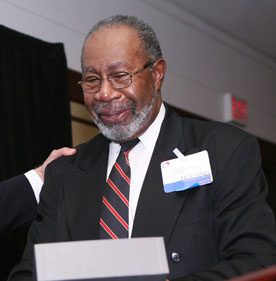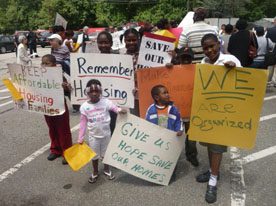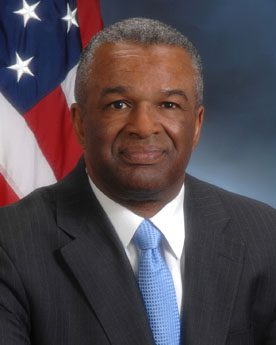
George Moses, chairman of the board of the National Low Income Housing Coalition. Photograph by Jamie Rose
A Section 8 resident for 15 years, a member of the Southwestern Pennsylvania Alliance of HUD Tenants, and a member of the Board of Directors of the Housing Alliance of Pennsylvania, George Moses became involved in tenant organizing by accident: not in the happy circumstance sense, but literally a hip replacement procedure moved him to seek new housing. Upon seeing the battles in which his neighbors (many of them elderly) had to engage, Moses started making some phone calls on their behalf.
Fast forward a few years later when a “little gray-haired lady” by the name of Cushing Dolbeare helps him find his way around his first National Low Income Housing Coalition conference. Some years after that, Moses, now chairman of the Coalition’s board, he is testifying before Congress on self-sufficiency and poverty deconcentration as they relate to federally assisted affordable housing. The tenant organizer looks back on his successes, but also how, in a time where organizing has a friendly ear in the administration, it’s more crucial than ever to put pressure on the federal government.
Shelterforce: How did you become involved with the Coalition?
George Moses: The Coalition was doing a lot of work around Project-Based Section 8 Housing and at the same time, I was looking for information as it related to privately-owned Section 8 housing — which is what I was living in at the time. After working with them for a bit, I was asked to join the board representing people living in Project-Based Section 8 Housing. Since I was living in that type of housing as well as being low income, I was a good fit for coming onto the Board of Directors.
That was 2000. What led up to that point to get you this far?
I got into it by a total accident. I had some major surgery — a couple of hip replacements and it required for me to have a place where everything was on one floor in an elevator building where I could take the fewest steps possible. I applied for an apartment in the city where I lived, in the community where I lived, not understanding what it all meant. But when I went to apply, I found out my rent would be subsidized and that I would only have to pay 30 percent of my income for rent.
Everything was fine until I spotted two elderly women asking the building manager some questions. He got very belligerent in his response, talked down to them, and said some terrible things to them.
Being who I am and the upbringing that I had, I stepped in and said he needed to show some respect. He left, but that led to me writing letters and getting answers to questions related to the cleanliness of the building, the graffiti on the walls of the building, the heat in the building, and the overall appearance and lack of maintenance on the property.
The tenants sort of deemed me the person to speak for them, and eventually, I was speaking for the tenants living in surrounding high rises all owned and managed by the same organization. This was around 1990.
As a founding member of The National Alliance of HUD Tenants, talk about how that grew out of the National Low Income Housing Coalition.
Correct — we piggybacked on the coalition’s conference and sort of had our own mini-conference on their conference and then we just kept growing. We would, however, always remain involved with what the Coalition was doing, because we were all reaching out and working for safety of affordable housing
You’re the first tenant to serve in the role of Chair of the Coalition board. Does that send any type of signal beyond your accomplishments in the field?
It means that there is a pressing need to continue to assure funding for public and assisted housing as well as funding to maintain and preserve it and in some cases build more of it. This is the housing that is needed for the people who are at most risk.
When I look at the situation in my city in other cities, we see decreases in the number of units that are made available for people of low income, we see the urgent need for that housing: public housing and assisted housing to be maintained in a meaningful, financial way — in a way so that it just doesn’t vanish for some reason.
This last year, we’ve really been advocating for full funding of the HUD programs, that is, the project-base vouchers including some additional vouchers, the full funding of the Public Housing Capital Fund so we don’t get into a situation where we have to demolish thousands and thousands of units without rebuilding a third of them.
And, of course, we need to make sure that residents are really engaged. I think that is the other critical part of this, that resident participation — in a meaningful way, not just “well, we had a meeting and some people came and that was it.” We need a meaningful, knowledgeable discussion between residents about what is happening to the housing that they live in. That, to me, is key at least for the foreseeable future. Further, while I’m sitting in the chair, part of my focus will be on making sure that the funding is there to support public and assisted housing, making sure that the National Housing Trust Fund is capitalized to its fullest.
What’s changed with this new administration?
Well, the first thing that has changed is the overall unease, or that things are going to change for the worse. This new administration is talking to us, you understand me? They are inviting us to meetings. They are asking for our opinion. And that is one of the bright spots that advocates see. But, in seeing that, we still have a lot to do.
We just have to get out there and still keep educating the new folks that are coming in along with some of the others who have been there and remind them that we’ve got to continue to make our case. We fully need to make sure that residents participate in a meaningful way.
How about Secretary Donovan?
The secretary is very good. He comes from a background at New York City’s Department of Housing Preservation and Development that required him to be inclusive. That said, we have to make sure that that inclusiveness is across the board in a meaningful way.
How do you get tenants involved in a meaningful, sustained way to effect change?
You know, I’ll be honest: it’s very difficult. In public housing and the Project-Based Section 8 Housing there’s no defined way that you can get tenants the information needed for them to make good decisions. I mean, there are mechanisms set up where housing authorities are supposed to have resident advisory boards or some type of place where that is all happening, but things still get muddied.
I’ll give you an example: the Housing Authority of the City of Pittsburgh is a Moving To Work agency. The city had to have a public hearing and comment period on a Moving to Work project — a demo disposition. So we gathered up what residents we could, got them to come downtown to testify and present all our information to the board, only to find out it was all for naught. The Board of Directors had already made the decision before we went through this public process.
So naturally I asked the board what the Resident Advisory Board said about this and there was just silence. But, I’m sure that somewhere within that application there is something that says they talked to residents. There is no situation where residents would say, “We want you to demolish our housing and scatter us out in the community” without a good plan to make that happen.
That’s what I’m experiencing here in Pittsburgh.
What needs to happen to prevent this?
You just have to keep pushing for that robust, meaningful resident participation where residents are given time to acquaint themselves with what’s going on because, I mean, housing authorities get paid, redevelopment officials get paid. That’s what they get paid to do.
And now, you have a resident association that is made up of a lot of single moms and older people and young men who do not have the skills necessary to be able to make decisions on this type of framework within 20 or even 90 days. And you don’t have time to make those adequate decisions.
On a lighter note, I understand that you first contacted the Coalition through an ad in Shelterforce.
Yes, I did. Yes, I did (laughs). I was reading through it and then I saw the ad for this conference — it was the Low Income Housing Information Service then. I tore out the ad.
I can remember to this day, I walked into the hotel where the conference was taking place and I had the ad in my hand.
But I was looking a little lost apparently, because this little gray-haired lady walks up to me and says, “May I help you?” I showed her the ad and she introduced herself to me. She says, my name is Cushing Dolbeare, and you are at the right place.
Cushing walked me in and introduced me to all the people who I needed to connect with.
That was my introduction, and I’ve loved Cushing ever since then. I tell her husband I’m one of his adopted kids, because if it weren’t for her taking me under her wing, I would not be Chair of the Board of the organization she founded.




Comments